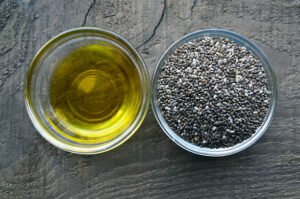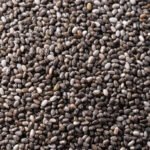Stay away from chia oil if you take blood-thinning medications or have bleeding issues. Omega-3 acids might increase bleeding risk by potentiating anticoagulant medications. Individuals with medical problems or on medications should see a specialist before starting any new supplement, including chia oil.
Sometimes, chia seeds and oil could cause allergies. Allergic reactions can cause rashes, hives, and breathing issues. Chia oil should be avoided by chia seed allergy sufferers. Similarly, as with any new food or supplement, first-time chia oil users should start with a small amount to assess for allergies.
Pregnant and nursing women commonly use nutritional supplements to foster nutrition further. Due to its nutritious value, chia oil could be sought after. Based on the lack of focus on chia oil’s effects during pregnancy and breastfeeding, women in these groups should see their doctor before adding it to their diet.
Cooking and preparing with chia oil is alright for the diet. However, chia oil has a lower smoking point than olive or avocado oil. Chia oil is unsuitable for high-heat cooking like frying. Instead, use it in sauces, smoothies, or sprinkled over dishes to preserve its nutrients and unsaturated fats.
Ecological elements influence chia oil’s wellbeing and maintainability. Chia plants utilize less water than different yields and have a low environmental effect. By advancing economic farming, chia oil is more secure and harmless to the ecosystem.

Chia oil is protected and intelligent for most diets when fittingly utilized. Its benefits are most huge when part of a different, moderate diet. Knowing one’s wellbeing, sensitivities, and chia oil’s culinary utilization can streamline its advantages and limit its dangers. Chia oil is an imperative and safe decision for some attempting to work on their food and well-being schedules as its notoriety develops and its well-being benefits and security concerns are perceived.
Additionally, chia oil’s nutritional content affects cholesterol levels. HDL, or “good” cholesterol, increases with chia oil. This cholesterol reduces heart disease risk by removing bad cholesterol from the bloodstream. Chia oil can affect lipids; thus, those with cholesterol difficulties should visit a doctor to safely incorporate it into their diets.
Chia oil’s calorie density should also be considered when eating it. Chia oil has 120 calories per tablespoon, like all oils. Understand the caloric impact of adding chia oil to meals for those watching their calorie intake or managing weight. Chia oil can assist health goals without adding calories by balancing its caloric input with overall dietary consumption. This cautious management helps enhance chia oil’s health advantages while keeping a healthy diet.
Proper Storage Practices for Chia Oil to Maximize Freshness and Efficacy
Chia oil stores well in the fridge, especially after opening. Oil oxidation is greatly slowed by cooling. When refrigerated, oil may thicken or cloud, although this is cosmetic and does not affect quality or safety. Before using, bring the oil to room temperature to regain its consistency.
Chia oil can be frozen for long-term storage. Freezing can keep oil fresh for longer, prolonging its shelf life. Chia oil expands when frozen, so leave space in the container. Oil must be stored in an airtight container to avoid freezer odors. Chia oil should be used promptly after thawing to prevent refreezing.
Chia oil must be handled properly to avoid contamination. Use clean implements to scoop or pour oil each time. Any moisture or food particles can transfer bacteria into oil, accelerating deterioration. After each usage, seal the lid to avoid oxidation and keep the oil fresher.
Chia oil shelf life depends on the extraction method, processing, and purification. Unopened, well-stored chia oil can last two years. The oil should be used within three to six months of opening to maintain freshness and nutritional content. Regularly sniffing the oil can also show its freshness; a harsh or bitter odor suggests rancidity and should not be ingested.
Given its health benefits and versatility in cooking and food preparation, chia oil is a beautiful complement to any diet. Maintaining these benefits requires proper storage. Chia oil can stay healthy in your diet for as long as feasible if kept cool, dark, and airtight. These simple chia oil storage procedures ensure you enjoy its nutritional advantages without compromise.
Exploring the Benefits of Chia Oil for Health and Nutrition
Chia is less commonly recognized that the oil collected from these tiny seeds is nutritionally rich. Due to its high omega-3 fatty acid concentration, chia oil has many health benefits.
Chia oil is valuable for its high alpha-linolenic acid (ALA) concentration, a necessary omega-3 fatty acid. The body cannot generate omega-3 fatty acids, so they must be eaten. Plant-based chia oil contains these fish oil fats, making it useful for vegetarians and vegans who may not obtain enough omega-3s.
Omega-3 fatty acids reduce inflammation. Prolonged inflammation can cause heart disease, diabetes, and arthritis. Regular chia oil consumption reduces inflammation and chronic disease risk. Omega-3 fatty acids also help maintain brain function and reduce cognitive loss with aging.
Chia oil also greatly benefits the heart. It boosts HDL cholesterol, the “good” cholesterol that prevents heart attacks and strokes. It also lowers triglycerides, LDL cholesterol, and blood pressure, improving cardiovascular health. Due to its properties, chia oil is a powerful natural heart disease prevention.

Chia oil contains omega-3s and antioxidants, which fight free radicals. Aging and many diseases are linked to oxidative stress caused by free radicals. Chia oil’s antioxidants destroy free radicals, safeguarding cells and promoting health and lifespan.
Chia oil promotes skin health significantly. Topically, it soothes skin and maintains hydration, reducing dryness and flakiness. Its antioxidants and omega-3 fatty acids help heal and moisturize skin, reducing fine lines and wrinkles.
Due to its mild, nutty flavor, chia oil is a good choice for cooking and meal preparation. Although it is delicate and not suitable for high-temperature cooking like frying, it’s great for dressings, smoothies, and finishing foods to maximize its flavor and health benefits.
Chia oil is eco-friendly. Chia plants are more water-efficient than other crops, making them a sustainable agriculture choice. As global environmental issues raise awareness and demand for sustainable food supplies, this is crucial.
Chia oil is healthful but should be part of a balanced diet. It is best eaten with other healthy fats, proteins, and carbs because no single food can give all the nutrients the body requires. Use it sparingly, like any other dietary supplement.
Chia oil is a healthy supplement with many benefits. Chia oil is diverse and potent, benefiting heart, brain, skin, and anti-inflammatory reactions. Chia oil can improve health and wellbeing, making it a desirable complement to modern diets. Its environmental sustainability makes it a responsible choice for health-conscious people who want to eat well and care for the world.






Leave a Reply